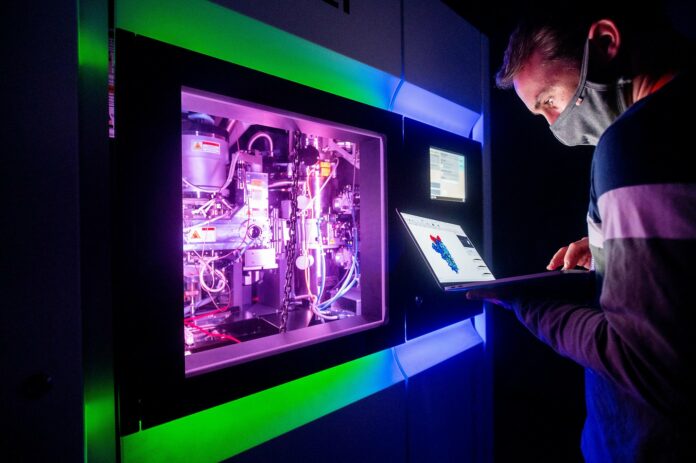Synthetic antibodies that researchers believe neutralize the coronavirus have been created at UCSF and could be available for use in nose sprays or inhalers within a few months if clinical trials go well. They hope the development will be a game changer in the worldwide effort to halt the pandemic.
The tiny, engineered protein molecules, developed in two UCSF laboratories by a team of 60 scientists, including doctoral and graduate students, are modeled after super-strength antibodies found in llamas and camels.
Dubbed AeroNabs, the synthetic antibodies bind to and inactivate the infamous spike proteins that the coronavirus uses to penetrate and commandeer human cells, according to a study published as a preprint Monday on the open access site bioRxiv (pronounced “bio-archive”) but not yet peer reviewed.
“It’s like a mousetrap. It binds to the spike protein so tightly that it basically never lets go,” said Peter Walter, a professor of biochemistry and biophysics at UCSF and co-inventor of the AeroNab molecules. “It’s a huge thing for us.”
The molecules are smaller but stronger than the antibodies humans produce naturally as a response to SARS-CoV-2, the coronavirus that causes COVID-19. In this case, researchers said, they prevent the spike protein from opening up like a flower before it attaches to cells, halting the virus’ ability to bind to the ACE2 receptors on human cells.
Walter, who is also a Howard Hughes Medical Institute investigator, said the concoction that his team developed is so adaptable that it could be dried out and transported as a powder wherever it is needed around the world.
“They are incredibly robust,” Walter said. “It’s basically like an antibody, but it’s about one-tenth the size.”
It was possible to create, he said, because there were already about 2 billion different synthetic molecules, or nanobodies, in databases. The UCSF team selected the best candidates and spent the past few months developing their specialized version.
The AeroNabs formulation is particularly valuable because it can be self-administered as a nasal spray or breathed in aerosol form through an inhaler. He estimated that protection would last in the lungs for about a day, so the treatment would have to be inhaled daily. It isn’t yet clear how long a nasal spray would last, he said, but it would probably require a few applications a day.
The idea is to protect people from COVID-19 until a vaccine becomes available. At least 150 potential vaccines are being worked on by scientists at pharmaceutical companies, academic groups and government laboratories around the world.
The UCSF research team is in discussions with pharmaceutical companies and other potential commercial partners to ramp up manufacturing and clinical testing of AeroNabs. If successful, Walter said, the treatment could be available to the public as an over-the-counter medication in three or four months.
“Their work is very exciting. It has a sound theoretical basis. It can be scaled very efficiently,” said John Swartzberg, an infectious disease expert at the UC Berkeley School of Public Health who was not involved in the study. “Of course, the major caveat is the question of its safety and efficacy. … If this pans out, it will be a game changer.”
Robert Siegel, an infectious-disease specialist at Stanford University who is unaffiliated with the study, said the UCSF research is an example of the kinds of innovative technological advances inspired by the pandemic.
“Ultra-high affinity synthetic nanobodies act in ways that are similar to some of the existing drugs for HIV, as well as some of our natural immunity to infection,” Siegel said. “However, they bring a number of potential advantages in terms of delivery, manufacture, stability, and remarkable specificity.”
He cautioned against getting too excited, though, until the new drug is validated by randomly controlled clinical trials, and until potential side effects are ruled out.
Many scientists have also been critical of preprint publications, insisting that the information is so preliminary that they should not be taken seriously or regarded as definitive research.
Walter, the co-inventor of AeroNabs, said, “We’ve engineered these molecules to a stage that we think it is as good as can be. Our hope, our dream, is to bring the world back to a state of normalcy.”
Peter Fimrite is a San Francisco Chronicle staff writer. Email: [email protected] Twitter: @pfimrite






